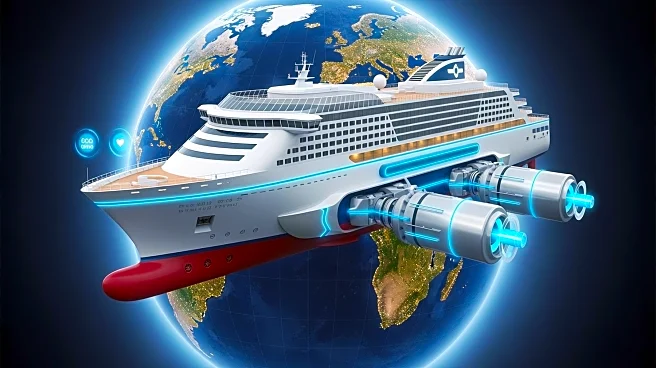What's Happening?
The International Maritime Organization (IMO) has made progress on its Net-Zero Framework for reducing greenhouse gas emissions from ships, following a week of closed-door meetings. Despite initial setbacks
due to pressure from the United States and Saudi Arabia, the working group achieved constructive participation from member states, focusing on key technical guidelines and the establishment of the Net Zero Fund. Observers noted a renewed sense of optimism, with countries working collaboratively on supporting guidelines to provide clarity for future implementation. The framework aims to incentivize energy transition and evaluate the lifecycle and sustainability of different fuels.
Why It's Important?
The IMO's progress on the Net-Zero Framework is significant for the global shipping industry, which is a major contributor to greenhouse gas emissions. By advancing decarbonization efforts, the IMO is setting a precedent for international cooperation on climate action. The framework's focus on energy transition and lifecycle analysis of fuels could lead to more sustainable shipping practices, reducing the industry's environmental impact. This development is crucial for achieving global climate goals and ensuring the shipping industry aligns with net-zero emission targets.
What's Next?
The IMO is scheduled to meet for a two-part summit in April 2026, where the Marine Environment Protection Committee will finalize important decisions and continue negotiations. The adjournment calls for member states to reconvene in October 2026, with the goal of implementing the Net-Zero Framework by January 1, 2029. The upcoming meetings will be critical for addressing remaining challenges and ensuring the framework's successful adoption. Stakeholders, including governments and NGOs, are expected to play a key role in shaping the framework's guidelines and promoting sustainable shipping practices.
Beyond the Headlines
The IMO's efforts to advance the Net-Zero Framework highlight the complexities of international climate negotiations, where geopolitical pressures can influence decision-making. The framework's success depends on balancing the interests of different countries and ensuring equitable climate action. The focus on lifecycle analysis and energy transition reflects a broader shift towards sustainable practices in the shipping industry, which could have long-term implications for global trade and environmental policy. The integration of wind propulsion and biofuels in shipping operations further underscores the industry's commitment to reducing its carbon footprint.










